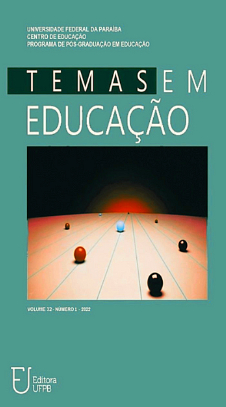Generic competences of Brazilian college students
human factors for work
DOI:
https://doi.org/10.22478/ufpb.2359-7003.2023v32n1.60951Keywords:
Higher education. Competencies. Interdisciplinarity.Abstract
The technological revolution that altered the world of contemporary work brought new demands. Representing a combination of cognitive, atitudinal, behavioral and ethical attributes, competencies describe the degree to which someone is able to perform tasks. Of an instrumental, interpersonal or systemic nature, generic competencies have received prominence for their applicability in multiple professional contexts. The development of these competencies finds in higher education the locus of its privileged field. The aim of the research was to verify self-assessments of generic competencies that Brazilian students of an interdisciplinary bachelor's degree understand to have acquired in their university course. Using the Generic Competencies Scale, 320 students from the last year of the course were evaluated. The results showed greater appreciation for "ethical commitment", "responsibility at work" and "concern with quality and improvement". Research can pave the way for new research on human capital and planning of pedagogical projects in higher education courses.
Downloads
References
AIRES, R. W. A.; MOREIRA, F. K.; FREIRE, P. S. Indústria 4.0: competências requeridas aos profissionais da Quarta Revolução Industrial. In: Anais do International Congress of Knowledge And Innovation - Ciki, vol. 1, n. 1., 2017. Disponível em: http://proceeding.ciki.ufsc.br/index.php/ciki/article/view/314. Acesso em: 26 ago 2020.
ANDRADE, C. Transição para a idade adulta: das condições sociais às implicações psicológicas, Análise Psicológica, Vol. 28 No. 2, 2010, pp. 255-267.
BENEITONE, P.; BARTOLOMÉ, E. Global generic competences with local ownership: A comparative study from the perspective of graduates in four world regions. Tuning Journal for Higher Education, vol. 1, n. 2, 2014, pp. 303-334. DOI: 10.18543/tjhe-1(2)-2014pp303-334
BENEITONE, P.; YAROSH, M. Tuning impact in Latin America: is there implementation beyond design? Tuning Journal of Higher Education, vol. 3, n. 1, 2015, pp. 187-216. DOI: 10.18543/tjhe-3(1)
CNE/CEB. Parecer 16/99. MEC/SEMTEC, Brasília. Disponível em: http://portal.mec.gov.br/setec/arquivos/pdf/PCNE_CEB16_99.pdf Acesso em: 26 ago 2020.
CHEERS. Career after Higher Education: a European Research Study. Disponível em: https://qtafi.de/cheers-european-graduate-survey.html Acesso em: 28 ago 2020.
EUROPEAN COMMISSION. High Level Group on the Modernisation of Higher Education: Report to the European Commission on improving the quality of teaching and learning in Europe’s higher education institutions. Disponível em: https://op.europa.eu/en/publication-detail/-/publication/fbd4c2aa-aeb7-41ac-ab4c-a94feea9eb1f Acesso em: 15 ago 2020.
FREIRE SEOANE, M.J. et al. La adecuación entre las competencias adquiridas por los graduados y las requeridas por los empresaios, Revista de Educación, Vol. 362, 2013, pp.13-41.
FREIRE SEOANE, M. J.; TEIJEIRO ÁLVAREZ, M.; PAIS MONTES, C. La adecuación entre las competencias adquiridas por los graduados y las requeridas por los empresários. Revista de Educación, vol. 362., 2013. DOI: 10-4438/1988-592X-RE-2011-362-151
FREIRE SEOANE, M.J. AND SALCINES, J.V. Análisis de las competencias profesionales de los titulados universitários españoles: la visión de los egresados. Perfiles Educativos, Vol. 32 No 130, 2010, pp.103-120.
GODOY, J. A. AND ADAM, J. M. Da qualificação às competências: o papel atribuído à educação na formação do trabalhador, Textura, Vol. 19 No. 40, 2017, pp.237-251.
GOMES, G. AND SOARES, A.B. Inteligência, habilidades sociais e expectativas acadêmicas no desempenho de estudantes universitários. Psicologia: Reflexão e Crítica, Vol. 26 No 4, 2013, pp.780-789.
GONDIM, S.M.G. et al. Competências socioemocionais: fator-chave no desenvolvimento de competências para o trabalho, Revista Psicologia, Organizações e Trabalho, Vol. 14 No. 4, 2014, pp. 394-406. Disponível em: https://doi.org/10.1590/S0102-79722013000400019 Acesso em: 26 ago 2020.
GONZÁLEZ, J. AND WAGENAAR, R. (Eds). Tuning educational structures in Europe. Informe final. Fase Uno, Bilbao, Universidad de Deusto, 2003.
IBGE. Painel de indicadores. Disponível em: https://www.ibge.gov.br/indicadores#desemprego Acesso em: 03 ago 2021.
MEC. Referenciais Orientadores para os Bacharelados Interdisciplinares e Similares. Disponível em: http://reuni.mec.gov.br/images/stories/pdf/novo%20-%20bacharelados%20interdisciplinares%20-%20referenciais%20orientadores%20%20novembro_2010%20brasilia.pdf Acesso em: 05 mai 2021.
MELO, A. A. S. Desenvolvendo competências e habilidades para o trabalhador do futuro: caminhos do Banco Mundial e da OCDE. Revista Lusófona de Educação, 51, 1, 2021, pp.3-27 DOI: 10.24140/issn.1645-7250.rle51.01
MONTEIRO, S. & ALMEIDA, L. S. Employability of higher education graduates: reflections and pedagogical implications. Revista Lusófona de Educação, 51, 2021, pp. 47-58 DOI: 10.24140/issn.1645-7250.rle51.03
ONU. Objetivos de Desenvolvimento Sustentável. Disponível em: https://brasil.un.org/pt-br/sdgs Acesso em: 03 mai 2021.
PERET, E. Mulher estuda mais, trabalha mais e ganha menos do que o homem, Agência IBGE Notícias. Disponível em: https://agenciadenoticias.ibge.gov.br/agencia-noticias/2012-agencia-de-noticias/noticias/20234-mulher-estuda-mais-trabalha-mais-e-ganha-menos-do-que-o-homem Acesso em: 05 fev 2021.
REFLEX. The Flexible Professional in the Knowledge Society. Disponível em: https://www.researchgate.net/publication/254434711_The_Flexible_Professional_in_the_Kowledge_Society_General_Results_of_the_REFLEX_Project Acesso em: 02 dez 2020.
SBA. Web Subsecretaria de Assuntos Metropolitanos. Governo do Estado de São Paulo. Disponível em: http://www.assuntosmetropolitanos.sp.gov.br/UnidadesRegionais/RMBS Acesso em: 05 out 2020.
TYLER, F. El comportamiento psicosocial, la competencia psicosocial individual y las redes de intercambio de recursos como ejemplos de psicologia comunitária, Revista Latino-Americana de Psicologia, Vol. 16, 1984, pp.77-92.
WERNKE, R. et al. As considerações e comentários acerca do capital intelectual, Revista da FAE, Vol. 6 No. 1, 2017, pp.15-26.
YATES, K.O. AND SELEMAN, R. Social Competence in school: towards an integrative developmental model for intervention, Developmental Review, Vol. 9 No. 1, 1989, pp.64-100, Disponível em: https://doi.org/10.1016/0273-2297(89)90024-5 Acesso em: 05 out 2020.
Downloads
Published
How to Cite
Issue
Section
License
Copyright (c) 2023 Revista Temas em Educação

This work is licensed under a Creative Commons Attribution 4.0 International License.
Authors who publish in this journal agree to the following terms:
. Authors retain the copyright and grant the journal the right to first publication, with the work simultaneously licensed under the Licença Creative Commons Attribution that allows the sharing of the work with acknowledgment of authorship and initial publication in this magazine. . Authors are authorized to assume additional contracts separately, for non-exclusive distribution of the version of the work published in this journal (eg, publishing in institutional repository or as a book chapter), with acknowledgment of authorship and initial publication in this journal.
. Authors are permitted and encouraged to publish and distribute their work online (eg in institutional repositories or on their personal page) at any point before or during the editorial process, as this can generate productive changes, as well as increase impact and citation of the published work (See O Efeito do Acesso Livre).



















